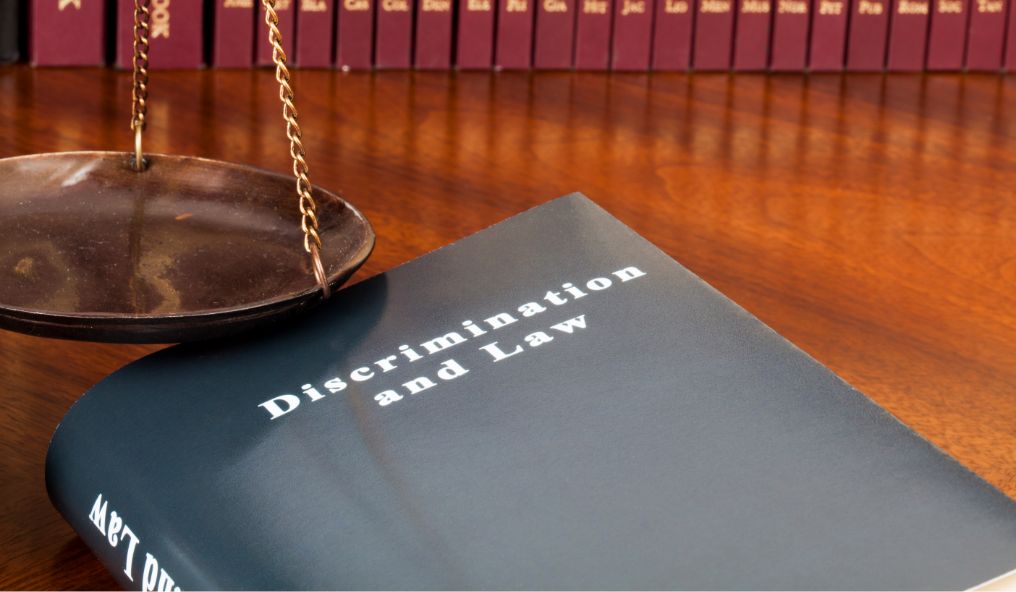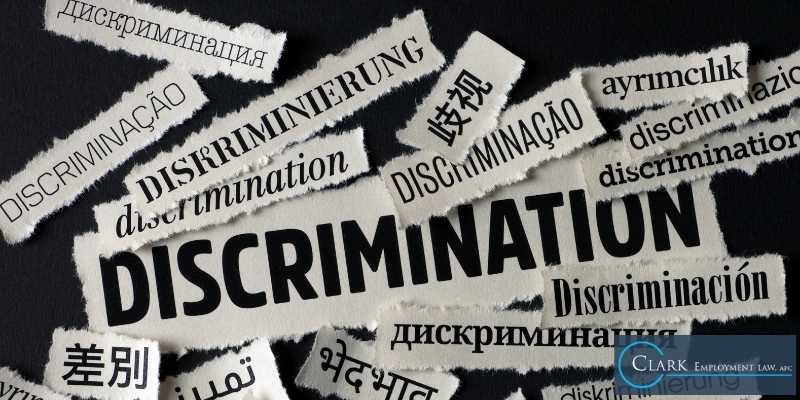Riverside Discrimination Lawyer
Riverside Workplace Discrimination Attorney

Every employee deserves to be treated fairly in the workplace. That is why there are both federal and state laws granting employees protection against certain behaviors or treatments by their employers. If you are experiencing discrimination, harassment, or other unfair treatment in your Riverside, California workplace, you may have a legal case against your employer. At Clark Employment Law, APC, we can help protect your rights.
Clark Employment Law, APC: Your Riverside Workplace Discrimination Lawyer
If you feel threatened or unsafe at your job, then your rights are being violated. Every individual should feel comfortable in their place of employment. At Clark Employment Law, APC, we understand just how much time you spend at work and how difficult it can be to deal with obstacles like discrimination and harassment. That is why we have dedicated our practice to helping individuals with employment law.
We have years of experience representing employees who have faced biased and harmful treatment in the workplace and can represent you through even the toughest of situations. From workplace discrimination to sexual harassment, we believe that there is no room for this harmful conduct in the workplace and can fight to have you treated with respect. Do not wait to get the legal help you need for a discrimination case against your workplace.

What Is Workplace Discrimination in California?
Workplace discrimination is an illegal behavior where an employee, applicant, or individual associated with a company experiences unfair or inappropriate treatment in the workplace. It most often occurs in one of two forms: either you yourself experience unfair treatment, or you and other employees witness unfair treatment taking place. According to state and federal laws, it is against the law to discriminate against or harass an individual based on:
- Race
- Gender
- Age
- Disability
- Sexual orientation
- Religion
- Nationality or ethnic heritage
- Weight
- Pregnancy or parenthood
- Criminal history
- Political engagements outside of work
- Medical issues
- Genetic information
Federal Discrimination Laws
The U.S. has implemented a variety of laws over the years to help protect employees in the workplace, including:
- The Civil Rights Act of 1964 (Title VII): grants protection for all employees and prohibits discrimination in any form based on race, religion, sex, color, or nationality.
- The Equal Pay Act of 1963: prohibits discrimination in the workplace based on gender, ensuring employers pay all genders the same rates for the same positions.
- The Americans with Disabilities Act: protects individuals from unfair and discriminatory treatment in the workplace due to physical or mental disabilities.
- The Age Discrimination in Employment Act: protects all individuals over the age of 40 from discrimination at work due to their age.
- The Pregnancy Discrimination Act: protects employees from discrimination based on pregnancy, childbirth, or other related conditions that may affect them.
- The Genetic Information Nondiscrimination Act of 2008: prohibits any employer from using genetic information to discriminate against current employees or potential employees in the hiring process.
- Immigration Reform and Control Act: protects employees from discrimination based on their national origin or citizenship status.
California Discrimination Laws
California has one of the most progressive forms of employee protection in the United States. With what is known as the Fair Employment and Housing Act (FEHA), California employers cannot discriminate, refuse to hire, discharge from employment or training, or be biased when discussing job privileges, compensation, and other benefits with current or potential employees.
FEHA applies to any business with five or more employees, offering a wide range of protection for workers across the state. California’s FEHA laws work in addition to federal laws such as Title VII, adding protection from workplace discrimination in categories like:
- Physical or mental disability
- Sexual orientation
- Relationship status
- Gender identity
- Military status
- Political affiliation
- HIV/AIDS status
- Ancestry
- Medical problems
- Domestic violence status

Forms of Workplace Discrimination
Discrimination is often categorized into two main areas:
- Disparate Treatment Discrimination
Disparate treatment discrimination cases are the most common kinds of workplace discrimination cases. This kind of discrimination occurs when an employer or co-worker specifically targets an individual because of one or more of their protected characteristics. For a case to be considered a form of disparate treatment discrimination, discriminatory intent must be proven. For example, if an employer refuses to hire or harasses an employee because of their race, that is disparate treatment. To file a successful case of disparate treatment discrimination, an employee will have to prove:- The employer qualifies for applicable anti-discrimination laws.
- The employer took unfair or inappropriate actions against an employee because of their protected characteristics.
- The employee experienced some form of harm on account of the employer’s conduct.
- Disparate Impact Discrimination
Disparate impact discrimination differs from disparate treatment in that it occurs when an employer does something that applies to all employees but only negatively affects those with protected characteristics. For example, a construction company might hire more men based on their stature and consequently discriminate against smaller women who apply. This can also occur when a business adopts a policy that disproportionately affects certain groups or does not offer them the same opportunities. To file a successful case of disparate impact discrimination, an employee must prove:- The employer qualifies for applicable anti-discrimination laws.
- The employer implemented some policy or action that disproportionately affected an employee or employees with protected characteristics.
- The employee or applicant experienced some form of harm on behalf of the employer.
How an Employment Law Attorney Can Help You
When it comes to filing a discrimination case against your place of work, having an experienced attorney on your side can help you in a variety of ways, including:
Collecting Evidence and Legal Information
Proving discrimination in your workplace can be difficult, especially if you are the only one experiencing it. When you hire an employment law attorney, you can work together to collect sufficient evidence for your claim as well as any other necessary legal information that may be required. Because filing a discrimination case is taken seriously by the government, there are a wide range of small details that must be taken care of to ensure that your case is handled properly.
Fighting for the Best Possible Outcome
When filing a discrimination case, you will most likely be going against your company, its dedicated lawyers, and other professional personnel. By hiring your own lawyer, you can ensure that your case is handled fairly and that the best possible outcome is fought for. Your attorney will know the amount of compensation you deserve and can make sure that the opposing parties are not frugal with their settlement. Unfair treatment in the workplace should not be tolerated, and your lawyer can fight to make that known.
Use Their Negotiation Skills
Most discrimination cases that an employee wins end in a settlement. Working with an employment law attorney can not only help you navigate the difficult legal proceedings that come with your case, but they can use their negotiation skills to prove your case and fight for the compensation you are entitled to. Most large companies will not want to have a large PR scandal on their hands, which means they are often willing to negotiate with the employee and their lawyer on a settlement.
FAQs About Employment Discrimination
What Is Considered Discrimination in the Workplace in California?
Federal and state laws define “workplace discrimination” as any behavior that treats an individual unfairly or inappropriately. Federal laws make it illegal to discriminate based on race, sex, religion, nationality, and mental illness. In addition to those categories, California law adds disability, sexual orientation, medical problems, military status, and more.
How Do I Prove Discrimination at Work in California?
You need to prove that either your employer targeted you or made a policy that had a negative disparate impact on you due to a protected characteristic. This can be difficult, as you must prove that your employer intended to do these things to achieve a discriminatory result. Therefore, it is in your best interest to hire an employment law attorney who can help you gather evidence and prove the mistreatment you experienced in your place of work.
What Is Racial Discrimination and Harassment?
Racial harassment involves any behavior in the workplace that is racially offensive, such as using slurs, promoting racially offensive media, using inappropriate gestures, making racially motivated rude comments, and more. The Civil Rights Act of 1964 was enacted to protect people against this form of discrimination, making it illegal under federal law.
What Is the Average Settlement for a Discrimination Lawsuit in California?
According to data from the Equal Employment Opportunity Commission (EEOC), the average settlement for out-of-court cases is around $40,000. This depends heavily on the severity of circumstances, the size of your employer, their liability, and more. Your attorney can help calculate the appropriate amount of damages for your case.
Can My Employer Punish Me for Filing a Discrimination Case?
No, it is illegal to penalize an employee who is being discriminated against. An employer is not allowed to retaliate or take any negative action toward the individual who is filing a case. If an employer attempts to retaliate against you, carefully document it, as it can be used to further bolster your case.
Riverside Discrimination Attorneys
No matter who you are, you deserve fair treatment—especially in the workplace. Here at Clark Employment Law, APC, we are dedicated to helping employees fight discrimination and harassment in the workplace. We believe that no employee should have to experience unfair or inappropriate treatment.
With federal and state laws protecting you, we can help you file a case against your employer for the mistreatment you have endured and make your voice heard. To learn more about our different employment law services and how our team may be able to help you, contact us today for more information.


